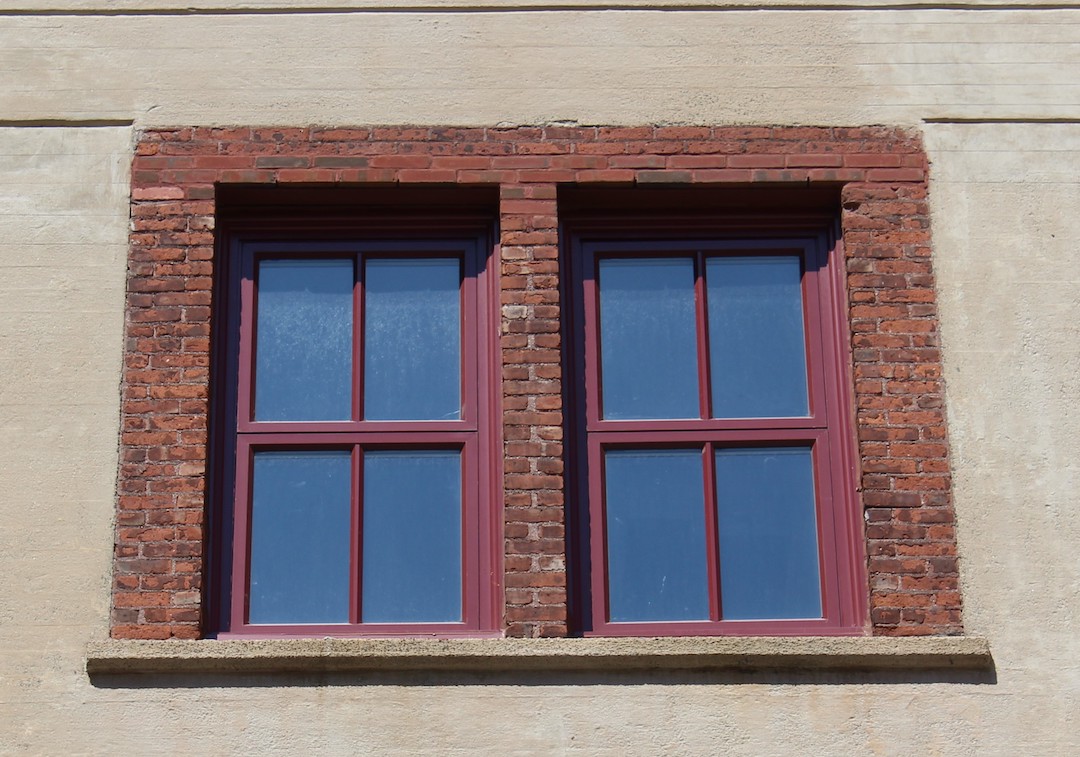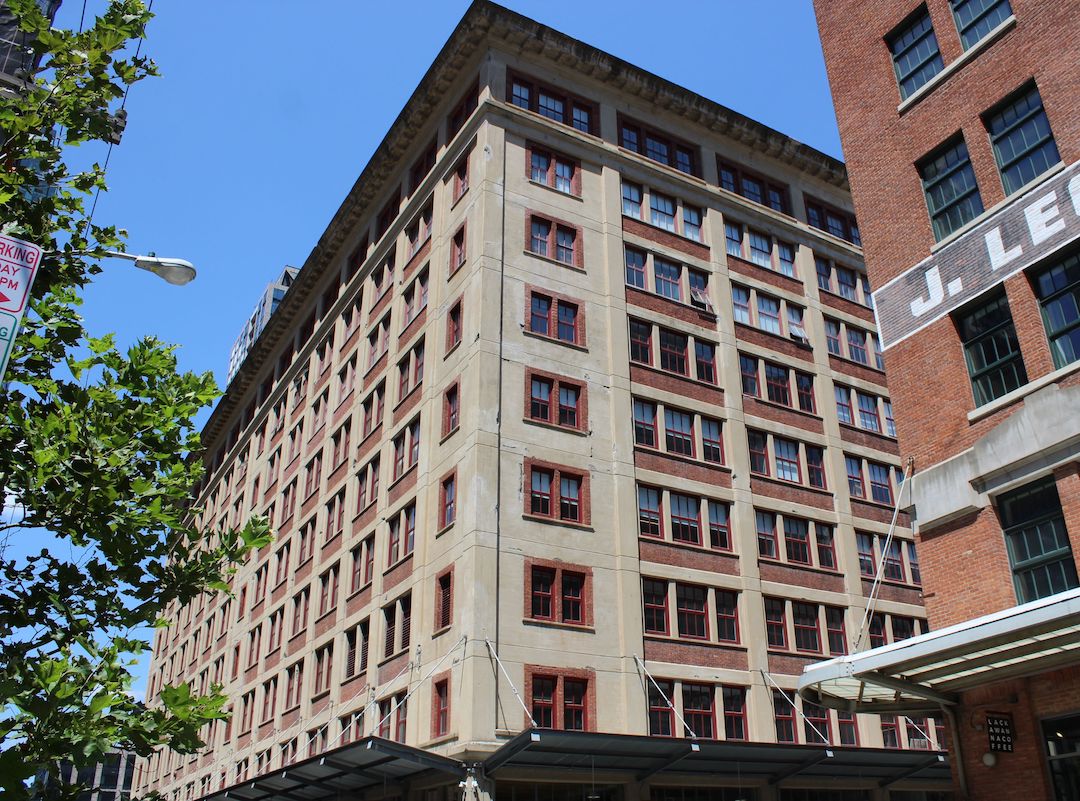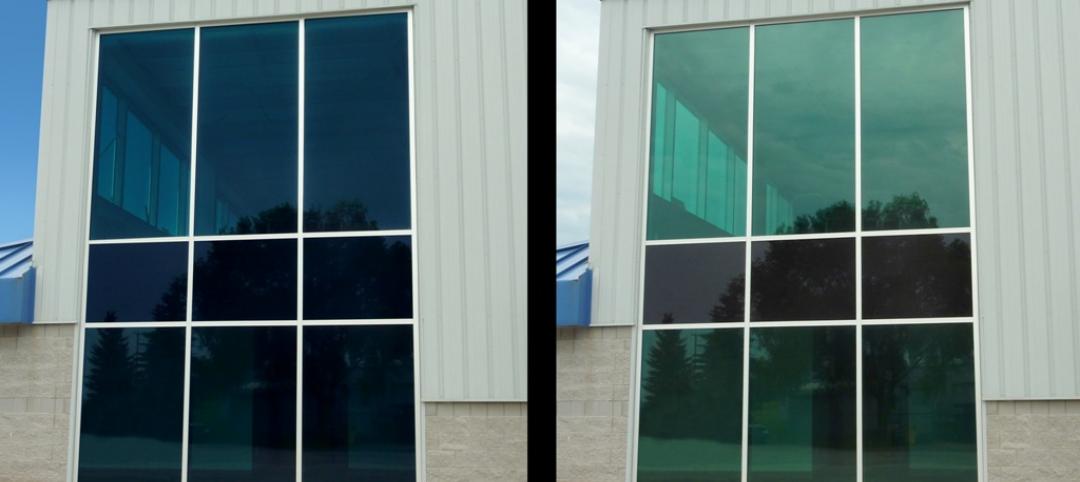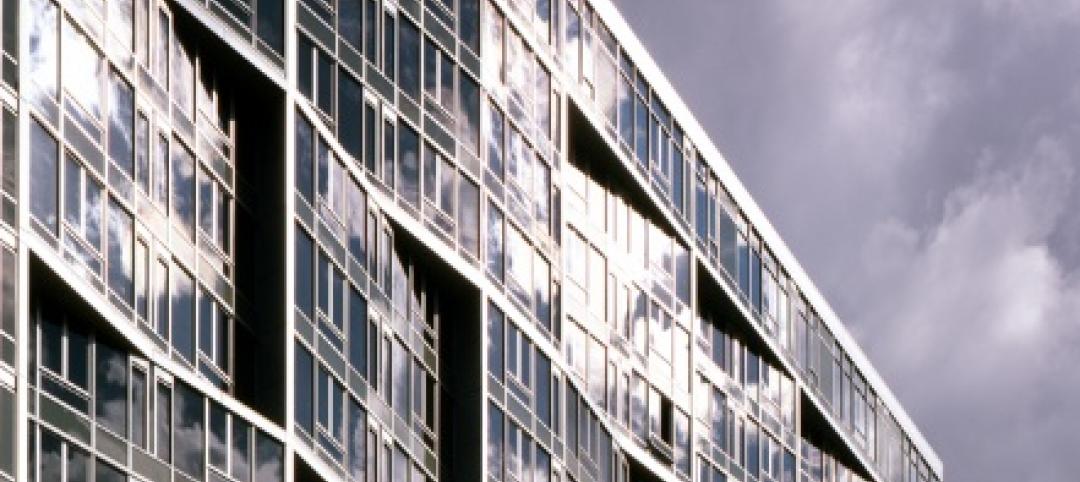Crystal Window & Door Systems products played a major role in the recent restoration and repurposing of a landmark building in Jersey City, N.J. The 10-story building at 150 Bay Street used 515 custom-modified Crystal windows on all four façades to retain the appearance and character of the 113-year-old historic structure.
The 150 Bay Street rehabilitation included the restoration of the brick and masonry façade, ornate roof cornice, and cantilevered cable-supported loading dock shed roofs. Replacing the antiquated wood windows with a modern window system that retained the historic characteristics of the building added to the challenge.
Crystal Window & Door Systems worked closely with the fenestration installer, BlueSky Windows, and the project architect and general contractor. Crystal fast-tracked the concept of, design, and fabrication of a custom window system solution which met and exceeded the project’s historic restoration requirements.
Custom-modified window system
The Crystal custom-modified window system replicates the original tall double-hung wood windows with a unique modern energy-efficient vertically stacked twin project-out awning aluminum window.
To truly deliver the project’s historic look, Crystal’s engineers used the resources of the company’s aluminum supply partners and its extrusion subsidiary to custom produce a special-frame variant of a standard projected window product, fabricate a 3-piece simulated divided light system, and replicate a historic-look sash with a 1-inch putty-line-look glazing bead as well as historic panning.
The 150 Bay Street project used Crystal’s Series 8620 Project-Out Awning windows. The Series 8620 windows were ordered in 2-lite vertically-stacked configurations and custom modified to suit the historic appearance requirements of the renovation project. With the building’s 14-foot-high loft ceiling heights, the windows are all very tall, the largest being 58½ inches wide by 81 inches high.
The Crystal Series 8620 is a top-of-the-line 3¼-inch thermal-broken frame awning window with an AW-PG80 rating. The energy-efficient window features 1” dual-pane insulated glass with warm edge spacer and argon filling, as well as two rows of bulb weatherstripping around the sash perimeter.
The Crystal Series 8620 offers cam lock handles and four-bar HS/SS friction hinges to hold the sash in open positions. Optional sash opening limit devices were also specified.

To meet the project’s historic specifications, Crystal made several custom modifications to the Series 8620. To emulate the building’s original wood windows, Crystal designed custom sash and frame extrusions, which its supply partners fabricated.
While the 2-lite stacked awning windows replicate the horizontal meeting rail of the original double-hung windows, each sash used special custom vertical simulated divided light (SDL) components to improve the historic aesthetics. The SDL components consisted of a standard colonial ⅝” between-the-glass grid with aligned 1¾-inch raised trapezoidal profile colonial tape-on aluminum grids affixed to the interior and exterior glass.
The project also required Crystal to produce several custom aluminum historic panning extrusions for the head, jamb, and sill of the window openings. All the Crystal windows, panning, grid components, and visible installation accessories were finished in a two-tone special Arroyo Red exterior and white interior to enhance the historic appearance of the building.
Key players for the Bay Street renovation project included fenestration installer BlueSky Windows and architect Fifield-Piaker-Elman Architects, both of New York City.
Three floors devoted to student housing
The repurposed 10-story, 203,000-square-foot building at 150 Bay Street now features ground-floor retail, art studio workspaces on the second floor, and business offices on the third floor. The upper floors are residential loft apartments, with three floors used by Nyack College as student residences, and luxury penthouses on the top floor.
Besides its historic, retro exterior, the building has many new features such as a roof patio, lounge areas, and a fitness center. The building is located in the Powerhouse Arts District, a lively artisan and business enclave in Jersey City.
Part of the resurgence of the state’s second largest city of over 250,000 residents, the Powerhouse Arts District has cobblestone streets, rehabbed former industrial buildings, shops, coffee houses, restaurants, bars, outdoor streetscape spaces, and art galleries.
Related Stories
| Sep 20, 2011
PPG, Pleotint to co-market environmentally adaptive glazing technology with low-e glass
Laminated between two lites of glass, SRT interlayer may be used monolithically or within an insulating glass unit.
| Jul 22, 2011
High-performance windows and doors
Learning objectives After reading this article, you should be able to: Understand issues of thermal performance and energy efficiency in relation to window and door systems; describe optimal detailing of the window-wall interface and how it contributes to building performance, sustainability, and occupant well-being; understand how durability contributes to sustainable windows/doors; and list sustainable O&M requirements for window and door systems.
| May 4, 2011
SAFTI FIRST to debut free apps for iPhone, iPod Touch, and iPad at AIA Convention
SAFTI FIRST, manufacturer of fire rated glass and framing solutions, will debut its mySAFTI app, the first interactive design tool that takes the guesswork out of choosing the correct fire rated glass product, at the AIA National Convention in New Orleans, May 12-14. Visit booth1634.
| Apr 22, 2011
AAMA releases voluntary tornado specification
As tornado season escalates and increased tornado activity has devastated parts of the Midwest and the South during he past few weeks, the American Architectural Manufacturers Association (AAMA) has released a voluntary specification for testing and rating building components that will be exposed to tornados and similar extreme wind and rain conditions.
| Apr 19, 2011
Is a building sustainable if it kills birds?
Migratory birds were flying into the windows and falling, dead or injured, to the foot of the LEED-Platinum FBI building in Chicago. The FBI building isn't the only LEED-certified structure to cause problems for migratory birds, however. Some of the more than 33,000 LEED-certified buildings in the U.S. use large amounts of glass to bring in natural light and save on energy—and all that glass can confuse birds.
| Apr 14, 2011
How AEC Professionals Choose Windows and Doors
Window and door systems need to perform. Respondents to our annual window and door survey overwhelmingly reported that performance, weather resistance, durability, and quality were key reasons a particular window or door was specified.
| Apr 11, 2011
From Wired Glass to Clear Solutions: Designing with Fire Rated Glass Today
This white paper provides readers with a solid understanding of fire rated glass based on the two types of FRG recognized in the IBC – fire protective and fire resistive glazing. The white paper is intended to give readers the ability to specify the correct, code-approved FRG product for particular applications based on the most up-to-date version of the IBC.
| Mar 22, 2011
Marvin honored by Minnesota Pollution Control Agency
Marvin Windows and Doors has been awarded a Certificate of Commendation by the Minnesota Pollution Control Agency (MPCA). The award honors Marvin for outstanding operation, maintenance and management of its wastewater treatment operations.
| Feb 22, 2011
BHMA proposes new standard for auxiliary locks
The Builders Hardware Manufacturers Association (BHMA) announces the publication of ANSI/BHMA A156.36 - 2010 American National Standard for Auxiliary Locks.










